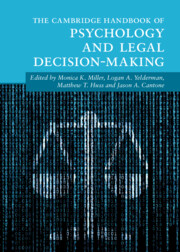Book contents
- The Cambridge Handbook of Psychology and Legal Decision-Making
- Cambridge Handbooks in Psychology
- The Cambridge Handbook of Psychology and Legal Decision-Making
- Copyright page
- Dedication
- Contents
- Figures
- Tables
- Editors
- Contributors
- Part I Introduction Chapters
- Part II Pretrial Phase Decision-Making
- Part III Trial Phase Decision-Making
- Part IV Postconviction Phase Decisions
- Part V Other Legal Decision-Making
- 34 Decision-Making in Immigration Court
- 35 Evaluation Decisions by Psychologists about Causation and Damages in Personal Injury and Employment Discrimination Cases
- 36 Factors Influencing the Decision to Commit White-Collar Crime
- 37 Tort Law Decision-Making
- 38 Judicial Decision-Making in Juvenile Dependency and Juvenile Justice Cases
- 39 Legislative Decision-Making
- 40 Decision-Making in Alternative Dispute Resolution
- 41 Criminal Decision-Making
- 42 Social Worker Decision-Making
- 43 Decision-Making in Civil Matters
- Part VI Perspectives from the Field
- Part VII Conclusion
- Index
- References
43 - Decision-Making in Civil Matters
The Role of Substituted Judgment
from Part V - Other Legal Decision-Making
Published online by Cambridge University Press: 22 February 2024
- The Cambridge Handbook of Psychology and Legal Decision-Making
- Cambridge Handbooks in Psychology
- The Cambridge Handbook of Psychology and Legal Decision-Making
- Copyright page
- Dedication
- Contents
- Figures
- Tables
- Editors
- Contributors
- Part I Introduction Chapters
- Part II Pretrial Phase Decision-Making
- Part III Trial Phase Decision-Making
- Part IV Postconviction Phase Decisions
- Part V Other Legal Decision-Making
- 34 Decision-Making in Immigration Court
- 35 Evaluation Decisions by Psychologists about Causation and Damages in Personal Injury and Employment Discrimination Cases
- 36 Factors Influencing the Decision to Commit White-Collar Crime
- 37 Tort Law Decision-Making
- 38 Judicial Decision-Making in Juvenile Dependency and Juvenile Justice Cases
- 39 Legislative Decision-Making
- 40 Decision-Making in Alternative Dispute Resolution
- 41 Criminal Decision-Making
- 42 Social Worker Decision-Making
- 43 Decision-Making in Civil Matters
- Part VI Perspectives from the Field
- Part VII Conclusion
- Index
- References
Summary
The law presumes that all persons are capable of guiding their own day-to-day lives, but the presence of various types and degrees of mental disability or mental incapacity can call this capability into question. When competency is convincingly demonstrated to be impaired, to the extent that decision-making requires input, persistent guidance, or outright control by some external entity, the civil courts might elect at that juncture to impose some form of “substituted judgment.” Substituted judgment undertakes to address three broad and potentially overlapping decision-making domains, described here with brief accompanying examples: prior judgment (regarding wills and other advance directives), present judgment (regarding informed consent and the corresponding right to refuse treatment), and future judgment (regarding guardianship and conservatorship). This chapter will explore each of these domains in detail, identifying the contributions mental health professionals can make to reliable and valid forensic assessment in this regard.
Keywords
- Type
- Chapter
- Information
- The Cambridge Handbook of Psychology and Legal Decision-Making , pp. 664 - 674Publisher: Cambridge University PressPrint publication year: 2024

